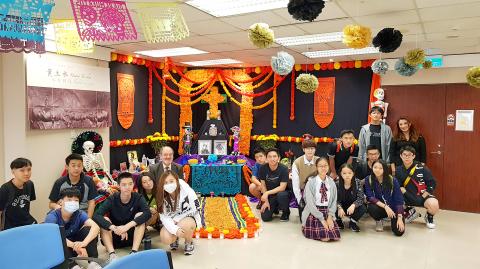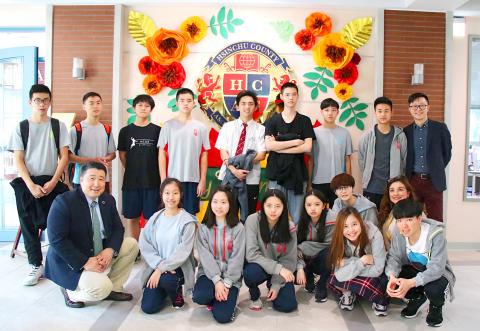Spanish is one of the most spoken languages in the world, with roughly 548 million speakers. Despite that, its popularity in Taiwan is not as high as other foreign languages — something that the Mexican Trade Services Documentation and Cultural Office is looking to change. Last year about 2,500 students pursued a Spanish major at universities, with an estimated 2,000 more taking it as a second foreign-language course.
Mexico’s trade office has conducted many activities this year to fulfill that purpose. Two young Mexican moviemakers participated in the Kuandu Festival of Cinema at the Taipei National University of the Arts. And Mexican Representative Martin Torres attended the Yilan International Arts Festival. Last month, they also brought the Mexican pianist Hernan Martinez Mercado who performed in many cities throughout Taiwan.
Torres says that there is a lot of power in culture.

Photo courtesy of the Mexican Trade Services, Documentation and Cultural Office in Taiwan
“Mexican culture, just like Taiwanese culture, is the result of thousands of years of history, and when you have two cultures that are so rich, sharing them opens the way for other venues, like business and investment” he said.
Torres added that culture is a very positive way of capturing the attention of others and getting them to know more about you, that is why he has been so focused on improving “cultural dialogue.”
Torres describes the relationship between Mexico and Taiwan as a very active one.

Photo courtesy of Principal Shon from the Hsinchu County American School
“[T]he fact that there are more than 300 Taiwanese companies based in Mexico, a constant flow of capital and of trade between the two that is only going to grow,” are very positive signs.
He added that there are many Mexican businessmen who are turning their eyes to Taiwan and that he strongly believes that this will lead to new avenues of cooperation.
Their last activity was the celebration of the “Day of the Dead,” which took place in the Taipei Economic and Cultural Office in Taipei and had the presence of Paloma Garcia, a Spanish teacher from the Hsinchu County American School, and a number of her students.
BRIGHT FUTURE
The students were optimistic about their future and told the Taipei Times that learning Spanish will positively influence their lives. Thanks to their interactions with natives of Mexico, they have experienced many of the differences between the Latin American and Asian cultures, like the way Mexican and Taiwanese people view death.
They said that for Taiwanese, death is a cause of sadness and mourning, while Mexicans think its a cause for celebration. They’ve also learned about the similarities the Asian and Latino cultures share, like strong family ties.
Garcia said that more effort needs to be made to promote the Spanish language — not only in universities, but in high Schools as well.
Taiwan can benefit from increasing its Spanish speaking population not only in the business and cultural aspects, but also by strengthening its friendship with many countries, whether diplomatic ties exist or not. With the help and support of government institutions like the Ministry of Education and Ministry of Culture, the Spanish language can get the boost it needs.

The Taipei Times last week reported that the rising share of seniors in the population is reshaping the nation’s housing markets. According to data from the Ministry of the Interior, about 850,000 residences were occupied by elderly people in the first quarter, including 655,000 that housed only one resident. H&B Realty chief researcher Jessica Hsu (徐佳馨), quoted in the article, said that there is rising demand for elderly-friendly housing, including units with elevators, barrier-free layouts and proximity to healthcare services. Hsu and others cited in the article highlighted the changing family residential dynamics, as children no longer live with parents,

The classic warmth of a good old-fashioned izakaya beckons you in, all cozy nooks and dark wood finishes, as tables order a third round and waiters sling tapas-sized bites and assorted — sometimes unidentifiable — skewered meats. But there’s a romantic hush about this Ximending (西門町) hotspot, with cocktails savored, plating elegant and never rushed and daters and diners lit by candlelight and chandelier. Each chair is mismatched and the assorted tables appear to be the fanciest picks from a nearby flea market. A naked sewing mannequin stands in a dimly lit corner, adorned with antique mirrors and draped foliage

The election of Cheng Li-wun (鄭麗文) as chair of the Chinese Nationalist Party (KMT) marked a triumphant return of pride in the “Chinese” in the party name. Cheng wants Taiwanese to be proud to call themselves Chinese again. The unambiguous winner was a return to the KMT ideology that formed in the early 2000s under then chairman Lien Chan (連戰) and president Ma Ying-jeou (馬英九) put into practice as far as he could, until ultimately thwarted by hundreds of thousands of protestors thronging the streets in what became known as the Sunflower movement in 2014. Cheng is an unambiguous Chinese ethnonationalist,

I was 10 when I read an article in the local paper about the Air Guitar World Championships, which take place every year in my home town of Oulu, Finland. My parents had helped out at the very first contest back in 1996 — my mum gave out fliers, my dad sorted the music. Since then, national championships have been held all across the world, with the winners assembling in Oulu every summer. At the time, I asked my parents if I could compete. At first they were hesitant; the event was in a bar, and there would be a lot